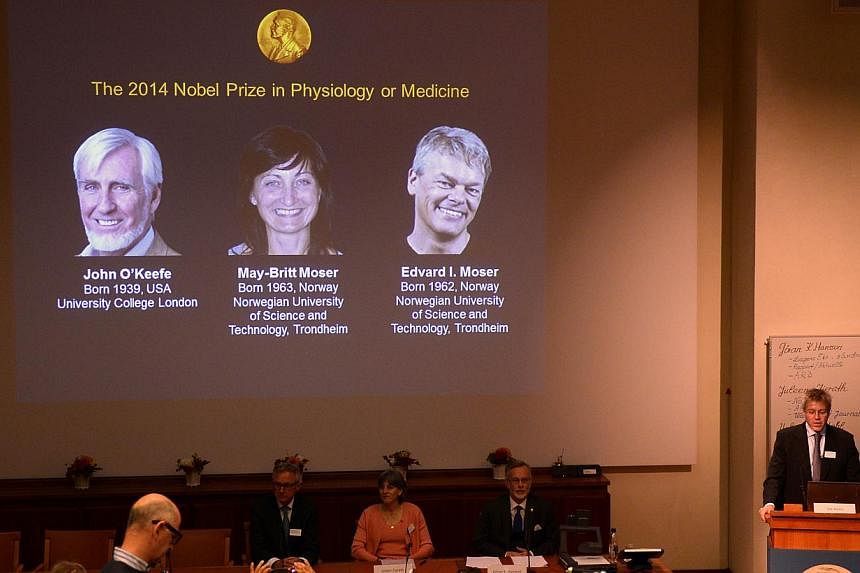STOCKHOLM (AFP) - Animal rights activists on Monday slammed the Nobel Committee for awarding the medicine prize for brain research which they said had caused terrible pain and suffering on lab rats.
The "sad" award, honouring two Norwegians and one British-American researcher, had involved invasive experiments that might not be necessary in an age of sophisticated brain-imaging techniques, they said.
"Awarding people who have spent decades inflicting terrible pain and suffering on countless animals in experiments is contrary to the otherwise progressive values of the Nobel Prize," the People for the Ethical Treatment of Animals (PETA) said in a statement. "It's wrong to drill into animals' skulls, destroy their brains with toxic injections and later kill them - as is still done by the Nobel awardees."
The Nobel Committee announced earlier Monday that the 2014 Nobel Medicine Prize went to a Norwegian couple, May-Britt and Edvard Moser, and their British-American mentor John O'Keefe, for discovering an "inner GPS" that helps the brain navigate.
Reacting to PETA's criticism, May-Britt Moser said that she and her team treated lab animals in line with Norwegian regulations.
"When we have the surgery, they are treated like humans, because they get a lot of anaesthesia and they get a nice treatment afterwards so they don't feel any pain," she said.
"We're extremely careful with animals," the professor at the Norwegian University of Science and Technology in Trondheim added. She said that despite the criticism she was happy that people were standing up for animal rights, because she is an animal lover herself.
Moser said that all animals in the laboratories she works in have names, as this makes researchers view them like pets and treat them accordingly.
"Among other things, our cages are bigger than required and they get to live together and have lots of toys," she said in an interview with Norwegian journal Technical Weekly Magazine in 2011. She added that this was also part of the research, as treating them well guaranteed getting better data from the experiments.
However, the Norwegian Animal Protection Alliance's legal advisor Live Kleveland called Monday's prize "sad".
"We think it's sad that the Nobel prize goes to research like this, because history shows many examples of research that has been useful, no doubt, but still is considered unethical by history," she said. "We believe that would be the case for this research as well, unfortunately."
According to Kleveland, the awarded experiments consisted of - among other things - implants of instruments in the heads of animals, psychological fear and stress such as experiments involving drowning, and destroying parts of the brains of the animals.
The animal rights group said it had followed this research for years and had unsuccessfully tried to stop it legally.
"We have not succeeded in stopping this one, but we believe that in the future experimentation like this on animals will not be accepted," Kleveland said.
PETA said the prize was "especially egregious in an era when sophisticated human brain imaging techniques that can record even single brain cells are available".
"The Nobel Committee should recognise innovative scientists who use modern and humane research methods that offer insights into human biology and behaviour without hurting animals," it said.

